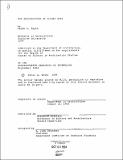The Architecture of Alvaro Siza
Author(s)
Testa, Peter
DownloadFull printable version (16.75Mb)
Other Contributors
Massachusetts Institute of Technology. Dept. of Architecture.
Advisor
Stanford Anderson.
Terms of use
Metadata
Show full item recordAbstract
The work of the Portuguese architect Alvaro Siza (1933), as it developed during the 1970's is an intriguing and dense expression of several contemporary concerns. The thesis focuses on three of Siza's works, the Antonio Carlos Siza house (1976-78), the projects for Kreuzberg commissioned by the International Building Exhibition of Berlin (1979), and the plan for the Malagueira district at Evora (1977- present). The analysis of these projects and Siza's few writings and statements is undertaken in an effort to tentatively articulate the principles which lie behind the forms of his architecture. From the analysis of specific works, two themes, thought to be central to Siza's enterprise, are identified and applied to a wider range of works. This inquiry does not provide a comprehensive account of Siza's ongoing research program. It does suggest a way of approaching the work, and provides a means of placing Siza's architecture within the context of Portuguese architectural culture and the current architectural debate.
Description
Thesis (M.S.)--Massachusetts Institute of Technology, Dept. of Architecture, 1984. MICROFICHE COPY AVAILABLE IN ARCHIVES AND ROTCH. Includes bibliographical references (p. 191-194).
Date issued
1984Department
Massachusetts Institute of Technology. Department of ArchitecturePublisher
Massachusetts Institute of Technology
Keywords
Architecture.